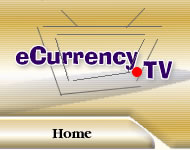The Collapse of US Dollar
eCurrency 101
by Russell
Wright
This article is written in response to "eCurrency"
(electronic currency) skeptics, and pseudo-economists who believe that
a currency backed by a military campaign is somehow stronger than a currency
backed by a strong marketing campaign. The following article assumes that
there is a difference between the two campaigns.
Hopefully you already know that the Federal Reserve is a
privately owned organization. Beyond the information contained in the
book "The Secrets of the Federal Reserve" by Eustace Mullins,
it is now pretty much common knowledge that the Federal Reserve is not
only printing money but has the ability to collect interest on
up to ten times the amount of the money that they have not yet manufactured.
This is a strange fact that no Harvard-trained economist
is ever truly comfortable with. Then again, Harvard-trained economists
tend to run the accounting departments of company's like Enron.
We have the list of shareholders that own the Federal Reserve,
and they are now available on the Internet. We are not yet sure what the
advantage of knowing these banks is -except perhaps that you may choose
not to acquire a credit card from them. This would prove difficult because
most of the major credit card banks are on the Federal Reserve charter.
What is more interesting is to consider what individual interests are
heading up these banks- and their global agendas. Without delving into
what some people consider "currency conspiracy theory" it is
believed the stockholders that make up the Federal Reserve Bank have managed
to maintain control of the economy since 1914 when the Federal Reserve
Act was signed into law.
The Federal Reserve is not connected to the US Treasury
department in any way. It cannot be found in any of the official governmental
directories that comprise the complete government departmental structure.
Therefore the name "Federal Reserve Bank" is an intentionally
misleading marketing ploy.
Ecurrency.TV holds the position that it is more than a little
silly to pretend that gold-backed ecurrency is somehow "less real"
than a US dollar that is printed out of thin air. There is a lot of economic
esoteric discussions about this issue which we also think are interesting
. . . but silly.
If you go to Investorwords.com
you will find the following definition of fiat money:
fiat money:
"Money printed
by a government as legal tender which is not redeemable
and which lacks economic value."
Of course the value of both gold and silver is also relative to social
agreement. Nevertheless, it makes sense to actually HAVE MONEY to back
up the value of printed currency. The US government, via the Federal Reserve,
prints money out of thin air backed
by nothing other than “belief”. Right now the US Dollar
is backed up primarily by a marketing
(military?) campaign.
Many economists and investors agree that the Federal Reserve
is struggling under the weight of possible collapse. The dawning of such
ecurrency merchant exchange systems like DX
in One signal a movement towards a globally connected economy.
In general the world's economic system is traded in US dollars.
In my view we are in the middle of a domino effect that will facilitate
the destruction of the US dollar as the world's currency reserve.
Even more interesting is that the destruction of the US
dollar is being done on purpose . . . by encouraging runaway deficit spending
and the printing of greater and greater amounts of FRN's (Federal reserve
Notes). This deficit spending has always been encouraged, but never has
it been so obviously designed to phase out the US dollar.
In summary, it is healthy to keep in mind that the Federal
Reserve is a privately held bank that prints fiat currency. This currency,
like any ecurrency, is only as good as its perceived value. When
the Reserve prints money, it pulls value out of thin air . . . literally.
Billions and billions of dollars can be printed for slightly
less than 3 cents per bill. It cost's the same whether or not a 1 or a
100 dollar bill is printed. Once the money is printed it is 'sold' to
various Federal Reserve member banks at a discounted rate. These banks
put the money in circulation at face value with an 18.98 cent profit.
The teller at your friendly neighborhood bank does not know
the basic facts that I have outlined above. If you query them on who owns
the Federal Reserve they will give you an answer that is based on a cognitive
illusion . . . theirs. They do not know who owns the system of which they
themselves are caught. The answer they will give you summarizes the Federal
Reserve bank into its smaller banks- but they will not tell you which
banks those are. You will be lucky if they even give you that bit of information.
The fact is, the teller at your local bank probably does not know what
the Federal Reserve is.
Our experience at Ecurrency.TV is that local US banks are “rigged” to
block “consumer” level international banking.
Our local bank teller and security staff knows so little about their
own digital banking system, that when we had a deposit of 324 dollars
downloaded into our business account from the offshore DX in One ecurrency
system, our bank President swore that it was a “teller transaction”.
He was convinced that we made the deposit "by hand" that very
afternoon.
In other words, local banking institutions do not know anything about
international banking or even the technical aspects of their own system
and the various ways to get money in and out of your "consumer grade"
bank account. They are dumbed-down by the Federal Reserve in order to
prevent economic liquidity across international lines. The US government
does not want the consumer to have easy access to offshore tax shelters
etc. That is a digital banking privilege left for “the elite rich” globalists.
We had one banker tell us that we could not do “fee-free” digital International
banking directly from our bank accounts unless we had a “sizable” amount
of cash in the account. The ecurrency
exchange movement could bring the convenience and abstraction of digital
banking to the average consumer.
Learn About Electronic
eCurrency Exchange Processing
No selling
No risk
No competition
Low investment
Click Here!

|

